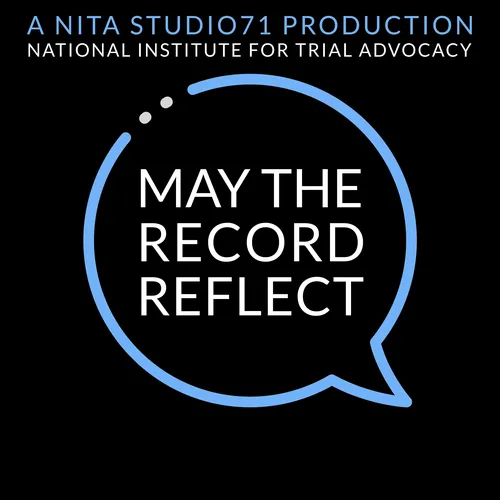
May the Record Reflect
If you’re a litigator or trial lawyer, your life is full—in and out of the courtroom. May the Record Reflect is the podcast of the National Institute for Trial Advocacy, and we know that if something related to lawyering is interesting to us, chances are it’s interesting to you, too. Trial skills, office life, personal development, and more—it’s all fair game on May the Record Reflect.
- Update frequency
- every 29 days
- Average duration
- 49 minutes
- Episodes
- 69
- Years Active
- 2019 - 2025

69. Keep Calm and Depose On, with Whitney Untiedt
Depositions can be a minefield—and not just because of the facts. In this episode of May the Record Reflect, trial attorney Whitney Untiedt returns to share her expert strategies for navigating the d…

68. I Feel for You: The Lawyer’s Occupational Hazard of Vicarious Trauma, with Prof. Angela Downes
Long hours, heavy caseloads, high stakes—such is the modern trial practice. But when lawyers represent survivors of violent or traumatic incidents, they often experience next-level stress caused by e…

67. Eight Steps for Handling Deposition Exhibits, with John Farrell
Depositions are a key building block in legal disputes, especially for cases that proceed to trial. According to veteran trial lawyer John Farrell, properly handling an exhibit so it’s admissible at …

66. Representing Survivors of the "Hidden Crime," with Barbara Barron
Content Warning: This episode discusses, in non-graphic terms, representing intimate partner violence survivors.
Being a trial lawyer is one of the toughest, most demanding professions out there, and…

65. Emergency Advocacy, with Judge Mark Drummond
For trial lawyers, “advocacy in a hurry” — injunctions, bail hearings, requests for orders of protection, emergency custody petitions, or immigration orders — calls for making the most of the limited…

64. Breaking the Ice: Voir Dire Tips and Tactics, with Judge Cynthia McCollum
As a sitting district court judge and 29-year public defender, NITA Program Director Judge Cynthia McCollum knows a thing or two about jury selection, and in this episode, she opens up about how to g…

63. Effective Oral Communication, with Mark Caldwell
NITA Program Director and former Resource Director Mark Caldwell joins the podcast to chat about how to effectively communicate with the various audiences in the courtroom to ensure they get — and co…

62. Cross-Examination Math: Less is More, More is Less, with Tom Innes
In Episode 62, Philadelphia trial lawyer and NITA Program Director Tom Innes introduces listeners to cross-examination math and how the idea of “less is more” increases the impact of the questions co…

61. "Don't Be Boring": Creating Your Commanding Courtroom Presence, with Steve Wood and Laurie Gilbertson
In 2021, former prosecutor Steve Wood told May the Record Reflect that to grow as a trial advocate, he had to accept that he is “insufferably boring.” What did he mean by that? And, how can it help y…

60. Demystifying Depositions, with Jason Young
In this rebroadcast of our 2022 interview, we gather all sorts of admissions—about depositions—from NITA NextGen alumni Jason Young. After taking and defending thousands of depositions throughout his…

59. At Your Service: Developing as an Advocate through Pro Bono Work, with Angela Vigil and Henry Su
The wish to leave the world a better place has long inspired people to attend law school and make a difference in the important ways only trial lawyers can. According to NITA Trustee Angela Vigil and…

58. It’s Greek to Me Ancient Rhetoric for Trial Lawyers, with Marian Grace Braccia
When people hear the term “rhetoric,” they often think of words full of sound and fury signifying nothing. Yet that is a woeful misunderstanding of the beauty and power of persuasive language and arg…

57. 10 Things You Should Know about Trial Psychology
Some of the most important heads to get into are those of the jurors seated for your trial. Fortunately, figuring out what makes people tick is both interesting and fun, and Temple University Directo…

56. She Blinded Me with Science, with Judge Ruth McMullin
If you’ve ever been baffled by scientific, technological, or financial evidence in your case or wondered how an expert witness arrived at their conclusions, former Gwinnett County Magistrate Judge Ru…

55. Tell It to the Judge, with Judge Randall Warner and Judge Christopher Whitten

54. Are You in Control Getting Real about Witnesses, with Judge Amy Hanley and Adrienne Johnson
You've probably heard that in direct examination, controlling your witness is all about witness prep, while in cross, leading questions are the key. Those oft-repeated tenets are true, say podcast gu…

53. Preparing Your Witness for the Effective Deposition, with Carl Chamberlin and Whitney Untiedt
In our second interview on The Effective Deposition, Program Director and author Carl Chamberlin returns to the podcast to talk about witness preparation. Joining him is NITA Trustee and Program Dire…

52. Let's "Speak the Truth" about Voir Dire, with Adam Kendall
Content warning: Mentions of sexual assault. Brief, non-graphic discussions of questioning the venire about sexual assault occur at 32:20–32:59 and 42:25–44:34.
Experienced trial lawyers are accustome…

51. Depositions: Asked and Answered, with Veronica Finkelstein
Taking a deposition presents enough challenge as it is without the interference of obstreperous or obstructive counsel, yet it happens anyway and you must be prepared to deal with it. Following her a…

50. Persuasion is an Inside Job, with Dominic Gianna
Cognitive bias is a barrier that lawyers must overcome in court—and it’s not just biases of the jurors they must consider, but those, too, of the judge, opposing counsel, expert witnesses, and even o…